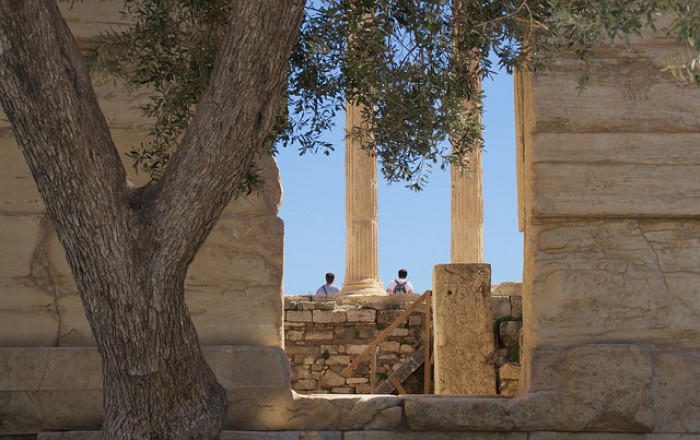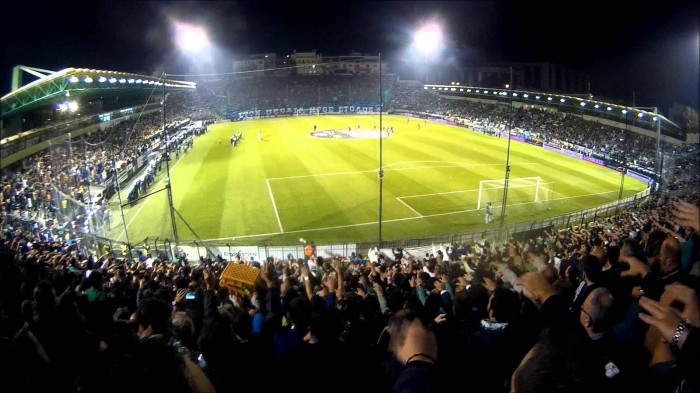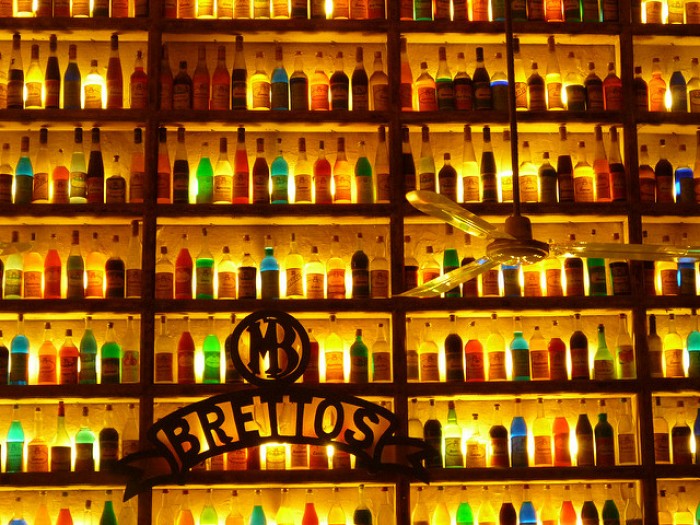The old adage, ‘When in Rome, do as the Romans do’, remains a popular mantra for travellers around the world today. The deeper a city’s history, the more valuable this advice becomes. Athens, a city brimming with both ancient and modern culture, offers the opportunity to experience vibrant nightlife and explore its historical treasures during the day. For a truly immersive experience, visitors should delve into both the past and present, embracing the lifestyles of both old and new Athens.
Also read: 15 Airbnbs in Rome for the Perfect Roman Holiday
Remembering Athena

Image credit: Thibaut Démare | Flickr
To uncover the extent of ancient Greek religion, one needs only to look at Athens’ namesake; it is derived from Athena, the Greek goddess of wisdom and Athens’ patron deity. It is said that Athena and Poseidon once vied for the right to possess a certain city and decided to hold a contest to determine the victor. Poseidon, the lord of seas, provided a well, from which sprang an abundance of water, but it was much too salty and was rendered undrinkable. Athena, on the other hand, raised an olive tree that provided ample shade and the olive fruit that, apart from being the symbol for Greek prosperity in its later years, is now the staple of many a delicious dish we enjoy today.
Of course, that city is now known as Athens. Not only was the divine battle engraved in the Parthenon, a single olive tree can also be found atop the Acropolis beside the Erechtheion – a monument to Athena’s providence. You, too, can be a part of the story by paying tribute to that tree, and appreciating how something insignificant and often overlooked became an integral part of Greek history.
Also Read: Beyond Santorini and Mykonos: 8 Fairytale Islands in Greece You Need to Visit
Shop at the Agora Market

Image credit: Sascha Kohlmann | Flickr
A city’s cultural heart often lies in its markets, where the daily staples are meticulously displayed and organized by their ingredients. These markets offer a unique chance to create authentic local cuisine with fresh, high-quality ingredients.
You can probably spot the Agora Market from a distance, mainly because of the vibrancy of the colours found on its produce. Lined up in rows under stalls resembling souks, you can find a huge range of ingredients – from bright orange carrots to green capsicums; from fat red chillies to plump olives bursting with flavour. And this is just the exterior, the result of excessive stalls spilling over. Inside, you see its resemblance to any other wet market, except this one comes with all the Mediterranean goodness you can ask for.
As you pick the protein for your next meal – lamb, goat, or skoumbri (pickled mackerels) – you will hear, all around you, haggling in Greek. You will probably not understand it, and sometimes it is better if it stays that way, but it certainly adds to the authentic market experience. There are also small, cramped ouzeries in the vicinity if you would rather taste the goodness of Greek cuisine without the tedious preparation.
Catch a football match

Image credit: i1os
Sports and Greece go a long way back. Even the Olympic Games, originally a tribute to the Olympian god Zeus, originates from ancient Greece. Since then, local sports have branched out far and wide, resulting in creative and typically gung-ho events like the Athens Spartathlon.
Football is particularly popular in Greece, especially in Athens. Fans turn out in spades to fanatically cheer on their local football club, Panathinaikos. Like any other football-crazed city, the best way to latch on to the fervour and raw passion of its inhabitants is to catch a game at their home stadium.
The Apostolos Nikolaidis Stadium, sporting green and white, the colours of the club, bursts into life at night, when games are typically held. With the floodlights and fans in full force, cheers and the occasional opposition jeers alike are deafening, and if you were to close your eyes, you could easily imagine yourself in an ancient Greek theatre, where instead of intricate plays that are usually associated with modern theatres, drunken revelry, feasting, and dancing took their places. This is Greek passion at its finest.
Also Read: 10 Family Friendly Airbnbs in Athens, Greece – Curated 2024
Athenian after-hours

Image credit: Pat Guiney | Flickr
The match has concluded. Regardless of the outcome, fans often head to the numerous bars and clubs in downtown Athens to celebrate or commiserate. Whether it’s a victory or a loss, revelers seek solace or excitement in the city’s nightlife.
Regardless, Athens is well-known for its thriving nightlife, and roaming the streets gives you options to a number of swanky establishments scattered around the area; some even offer views of the Acropolis. Whichever you choose to wander into, it will probably be uniquely themed. From the Latin-inspired Enzzo de Cuba dance club, to the classically Mediterranean Noel bar, you will experience the best of both worlds, the coming together of modern entertainment against the backdrop of eye-catching Greek architecture. And if you thought for one moment that this represents a disconnection from ancient Greek tradition, just remember that ancient followers of the Greek god of celebration, Dionysius, often engaged in rowdy parties supposedly accompanied by his sacred creatures, the centaurs.
Also read: Discovering the Pantheon in Rome: A Must-Visit Monument and Ticket Guide
Though Greece continues to remain relevant, its mythology never fails to show up in little nooks and crannies of everyday life; you just need to keep your eyes – and heart – open.




